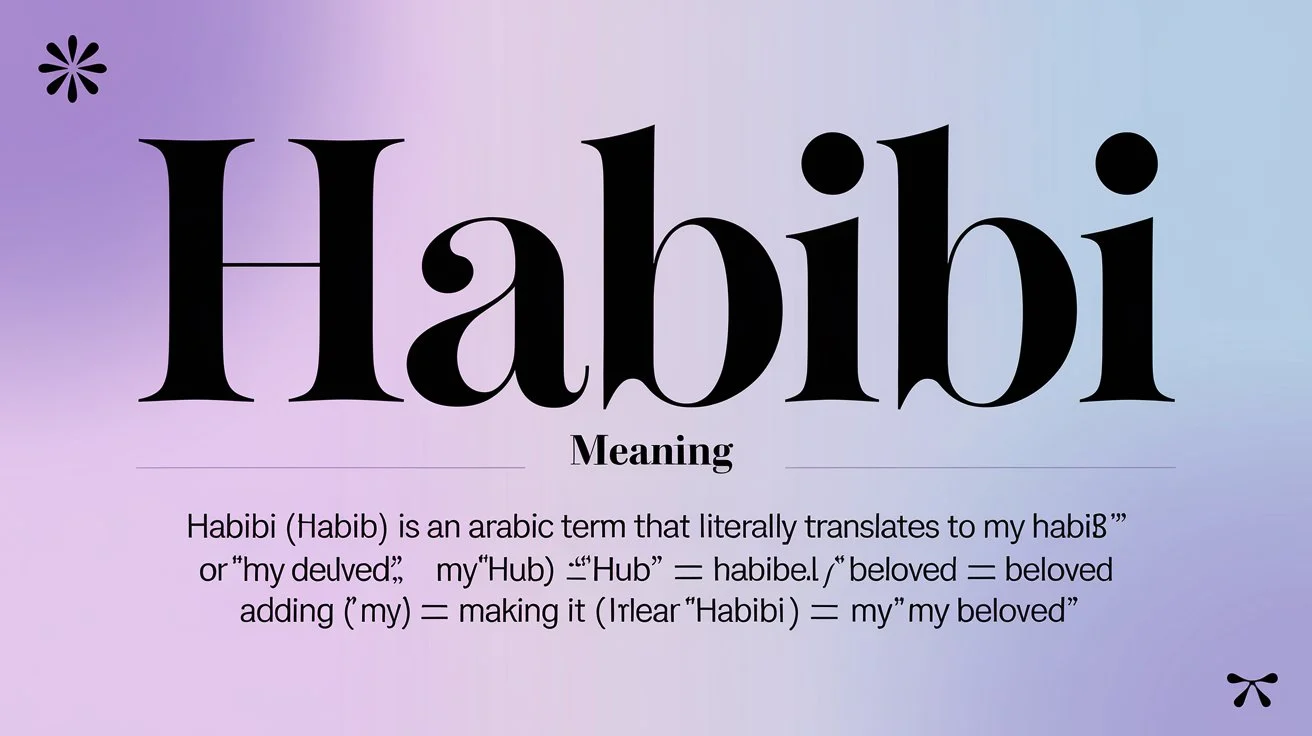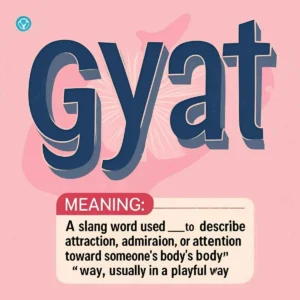If you’ve ever listened to Arabic songs, watched Middle Eastern movies, or heard friends from Arab backgrounds talking, chances are you’ve come across the word “Habibi.” It’s one of the most widely recognized Arabic terms around the world, often used in songs, memes, and even in casual conversations. But what does Habibi really mean? Does it change when said to a friend, a lover, or even a stranger?
This article explains the full meaning of Habibi, its cultural significance, how it’s used in daily life, and the different variations you might hear.
Habibi Meaning
The word Habibi (حَبيبي) is an Arabic term that literally translates to “my beloved” or “my dear.”
- “Hubb” (حب) = Love
- “Habib” (حبيب) = Beloved
- Adding “-i” (ي) = My → making it “Habibi” = “My beloved”
It’s often used to show affection, warmth, or closeness—similar to saying “darling,” “dear,” or “love” in English.
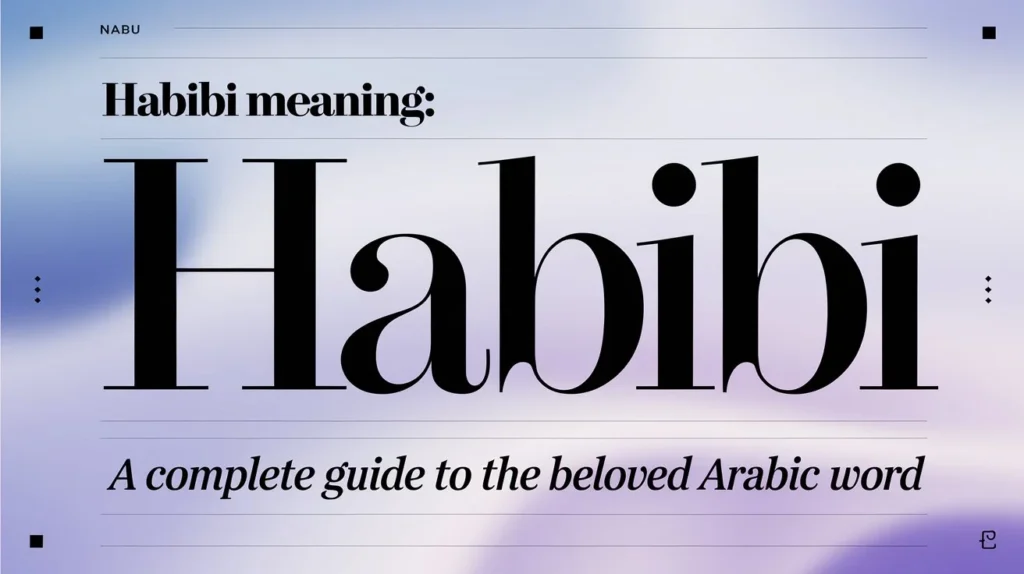
Habibi Meaning in Arabic
In Arabic, Habibi (for males) and Habibti (for females) are terms of endearment. They’re used not just romantically but also platonically between friends and family.
For example:
- A mother might call her son “Habibi.”
- Friends greeting each other often say “Marhaba Habibi” (Hello my dear).
Habibi Meaning in English
In English, Habibi is most commonly translated as:
- My love
- My dear
- My darling
- My beloved
The meaning depends on the context—it could be romantic or just friendly.
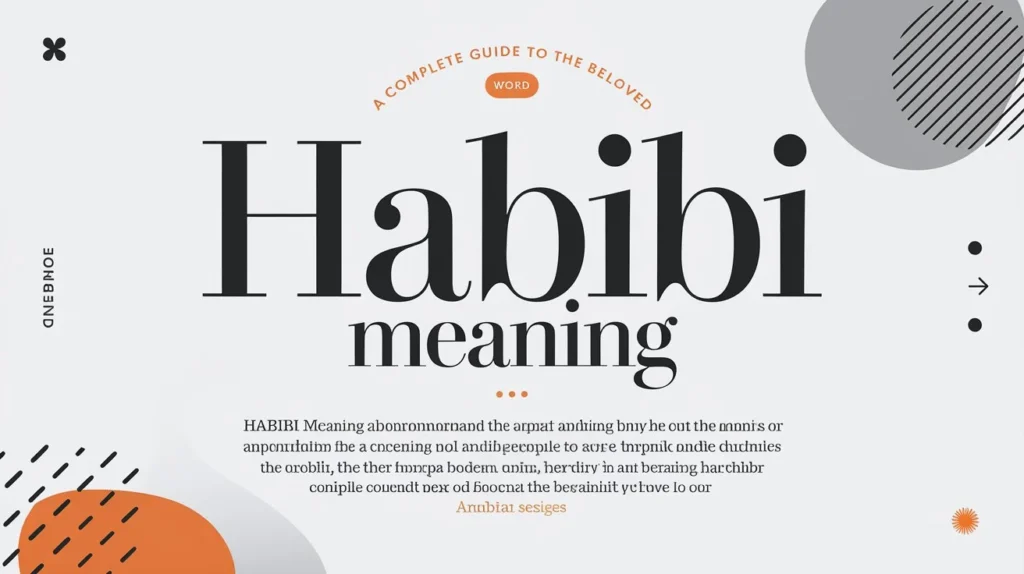
Yalla Habibi Meaning
The phrase “Yalla Habibi” (يلا حبيبي) means “Let’s go, my dear” or “Come on, my friend.”
- Yalla = Come on / Let’s go
- Habibi = My dear
It’s often used casually to encourage someone to hurry up or join in.
Example: “Yalla Habibi, we’re going to the party!”
Habibi Meaning in Hindi
In Hindi, Habibi is directly borrowed from Arabic and usually means “मेरे प्रिय” (Mere Priya) or “मेरे प्यारे” (Mere Pyare)—both translate to “my beloved” or “my dear.”
Thanks to Bollywood and music, many Indians recognize Habibi as a romantic word.
Habibi Meaning to a Girl
When a man says Habibi to a woman, it usually means “my love” or “darling.”
However, the feminine form is actually Habibti (حبيبتي).
So:
- Habibi = Said to a male
- Habibti = Said to a female
But in songs and slang, people sometimes use Habibi universally.
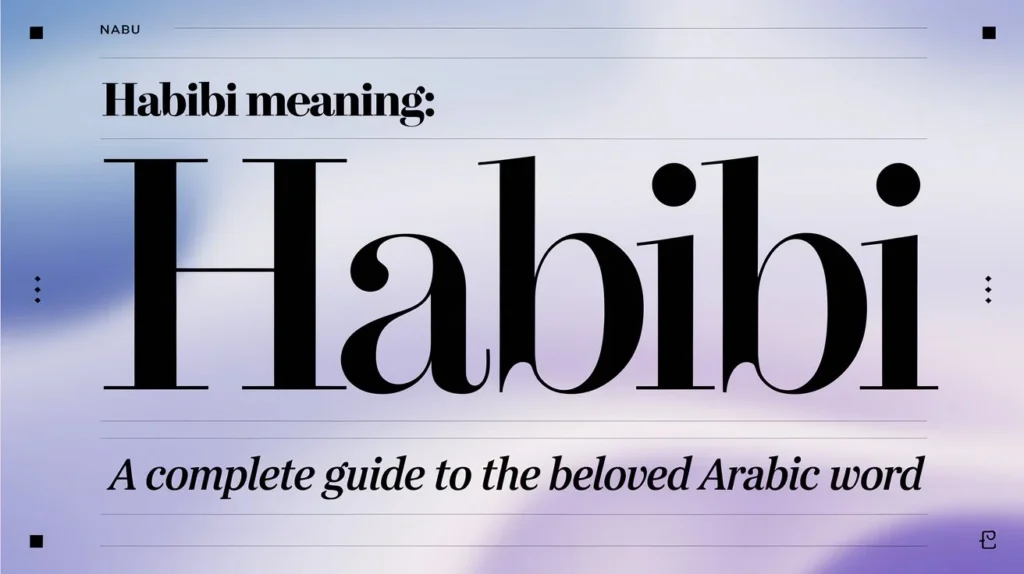
Wallah Habibi Meaning
The phrase “Wallah Habibi” (والله حبيبي) combines two powerful expressions:
- Wallah = I swear to God
- Habibi = My dear
So, “Wallah Habibi” means “I swear, my dear” or “Honestly, my friend.”
Ya Habibi Meaning
The expression “Ya Habibi” (يا حبيبي) means “Oh my dear” or “Oh my beloved.”
- “Ya” in Arabic is a calling particle, used to address someone directly.
Example: “Ya Habibi, I missed you so much.”
Shukran Habibi Meaning
- Shukran = Thank you
- Habibi = My dear
So, “Shukran Habibi” means “Thank you, my dear.” It’s a polite yet affectionate way of showing gratitude.
Habibi Meaning in Islam
In Islamic culture, Habibi isn’t a religious term but is widely used in everyday conversations by Muslims worldwide. It simply expresses love and care.
For example, Prophet Muhammad (PBUH) was often referred to as Habib Allah (Beloved of God).
Hamood Habibi Meaning
The phrase “Hamood Habibi” comes from a viral animated song on YouTube. It doesn’t have a deep cultural meaning—it’s just a fun internet meme where a character named Hamood is affectionately called Habibi.
Habibi Meaning Slang
In modern slang, especially in Western countries, Habibi is often used playfully to mean “bro” or “buddy.”
For example:
- “What’s up, Habibi?”
- “Thanks, Habibi!”
My Habibi Meaning
When someone says “my Habibi”, they’re doubling the possessive—basically meaning “my dear one” or “my love.”
Yalla Habibi Meaning in English
Direct translation: “Come on, my dear.”
It’s often heard in Arabic pop songs and dance music.
Al Habibi Meaning
The prefix “Al” in Arabic means “the.”
So, Al-Habibi would translate to “The beloved.”
It’s not very common in daily speech but may appear in poetry or songs.
Marhaba Habibi Meaning
- Marhaba = Hello / Welcome
- Habibi = My dear
So, Marhaba Habibi = “Hello my dear.”
Inshallah Habibi Meaning
- Inshallah = God willing
- Habibi = My dear
So, Inshallah Habibi means “God willing, my dear.”
Assalamualaikum Habibi Meaning
- Assalamualaikum = Peace be upon you
- Habibi = My dear
So, Assalamualaikum Habibi = “Peace be upon you, my dear.”
Daily Use of the Word Habibi
Here are some common ways Habibi is used in daily conversations:
- Greeting: “Marhaba Habibi!” (Hello, my dear!)
- Encouraging: “Yalla Habibi!” (Come on, my friend!)
- Thanking: “Shukran Habibi.” (Thank you, dear.)
- Comforting: “Don’t worry, Habibi.”
- Expressing love: “I miss you, Habibi.”
- Slang with friends: “What’s up, Habibi?”
FAQs About Habibi
Q1: Can women use the word Habibi?
Yes, but when speaking to another woman, the correct form is Habibti.
Q2: Is Habibi always romantic?
No, it can be romantic, friendly, or even used casually. Context matters.
Q3: What’s the difference between Habibi and Habibti?
- Habibi = used for males
- Habibti = used for females
Q4: Why is Habibi so popular in songs?
Because it’s catchy, emotional, and universally understood as “my love.”
Q5: Is it okay for non-Arabs to say Habibi?
Yes! Many people worldwide use it affectionately, especially among friends.
Conclusion
The word Habibi is more than just a translation of “my love.” It’s a cultural symbol of warmth, affection, and closeness used in countless ways across Arabic-speaking communities. Whether in songs, greetings, or casual chats, Habibi remains one of the most beautiful words that connect people.


